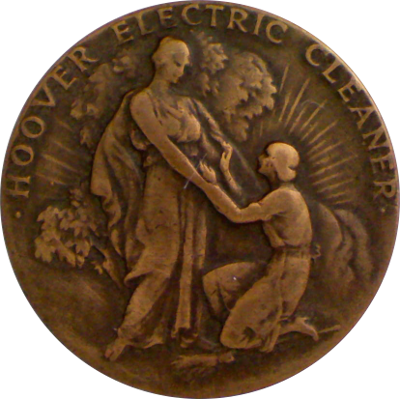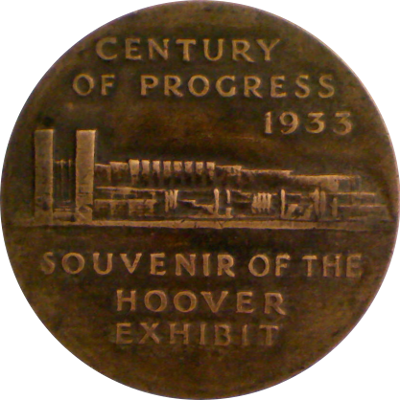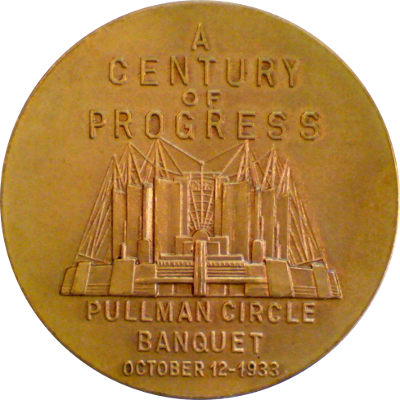Century of Progress Exposition 1933-34
Click on the Medals tab to see some of the medals issued for this exposition.
Click or tap the medals to see their reverse sides.


The obverse bears kneeling woman with old-fashioned broom beneath her being raised by goddess; trees and sun in background. Above, HOOVER ELECTRIC CLEANER
The reverse bears image of Chicago fair grounds. Above, CENTURY / OF PROGRESS / 1933; below, SOUVENIR OF THE / HOOVER / EXHIBIT
The Hoover Company was founded as a floor care manufacturer in North Canton, Ohio, in 1908. It so completely dominated the electric vacuum cleaner market in the first half of the 20th century that "hoovering" became synonymous with vacuum cleaning, much as "googling" became synonymous with web searching at the beginning of the 21st century.
This is such a handsome token, and also one whose imagery is so completely over the top! I would never belittle the impact that the invention of the vaccum cleaner had on a woman cleaning house in the 1930s, but I always have to smile at the woman's look of abject adoration at the prospect of being freed from toil and at the rising sun promising a brighter future.
The token measures 32mm in diameter. It was handed out to visitors of the Hoover Exhibit at the Chicago Cenury of Progress Exhibition of 1933. Its obverse is based on the Hoover Silver Jubilee token from one year earlier.


This medal's obverse bears a view of the Travel and Transport Building on the World's Fair grounds. Above, A / CENTURY / OF / PROGRESS; below, PULLMAN CIRCLE / BANQUET / OCTOBER 12 - 1933
This medal's reverse bears the P C logo of the Pullman Circle.
The Pullman Car Company was one of the big sponsors of the Chicago World's Fair. George Pullman had been long dead by 1933 but his company still had a strong local presence in Chicago. In 1880 he had bought 4,000 acres of land 14 miles south of Chicago and hired well-known architects and city planners to design a model town for his factory workers. The town was widely praised and hailed as a model city and indeed, according to mortality statistics, it was one of the most healthful places in the world.
Despite or in addition to the good intentions of its founder, it was also expected to turn a profit for the Pullman Company. This became an issue in 1894 when a depression forced layoffs and wage reductions at the Pullman factories without commensurate reductions in rents and fees in the factory town. The resulting strike spread to cover the entire nation and, after a round of intentional escalations, federal troops were brought in and 34 people died. Pullman and the railroad owners won the battle but widespread public condemnation lost them the war. In 1897 the Illinois Supreme Court ordered Pullman to divest itself of the town of Pullman. In 1898 it was annexed by the city of Chicago.
In the early 1930's, a few years before its forcible breakup, the Pullman Car Company was still a strong company. The Pullman Circle referenced on the medal was the company's Family Club that organized social and athletic events for employees.
I know neither the artist nor the mint which struck this handsome World's Fair medal. Please contact me if you have any additional information.
Contact me if you have links that might merit inclusion on this page.